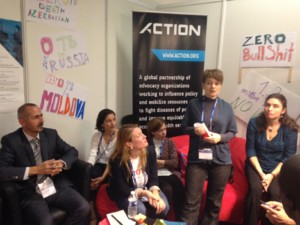The TB Europe Coalition organised today a session at the advocacy corner of the 44th Union World Conference on Lung Health in Paris. The session, entitled “European Voices in the TB fight”, gave the opportunity to activists from Eastern Europe and Central Asia to speak about their experiences as former TB patients and advocates.
“When I found out I had Multi Drug-Resistant TB (MDR-TB) I was scared and confused, I didn’t understand what was happening to me”, explained Stefan Radut from Romania. During his long treatment, Stefan had to take an injection and 18 different pills every day. Treatment caused him anxiety and hallucinations, he was depressed and his hearing capacity was compromised. “I experienced exclusion and isolation”, said Stefan. “I couldn’t get out and my friends were scared of visiting me”. In his misfortune, Stefan was lucky because he could access good treatment in a country, Romania, where only very few MDR-TB patients have access to proper drugs, psychological and social support. According to latest data, Romania has a MDR-TB treatment success rate of 16% compared to for instance 91% in Pakistan.
Oxana Rucsineanu from Moldova has also been affected by the disease. After being treated for MDR-TB, she founded the SMIT patient organisation, which works to empower TB patients by raising awareness about their rights, including social and psychological support, and how to practically access these services. “We need to raise the voices of TB patients into discussions about decisions that affect their lives” Oxana said.
“When I firstly heard about it in 1999, MDR-TB was only a degeneration of TB due to improper or uncompleted treatment. Now MDR-TB is all over the place”, stressed Elchin Mukhtarli of the NGO “Support to Health” in Azerbaijan. MDR-TB has become a bacterial epidemic in itself and has just been declared by WHO as a public health emergency.
The session was also an opportunity to hear more about challenges faced by civil society organisations in Bulgaria, Macedonia and Russia and to exchange views with TB activists from other countries that are experiencing similar problems outside Europe, such as Pakistan and Kenya.
Sadly the voices we heard today are only those of the most lucky ones. Too many voices of former TB patients will never be heard.




